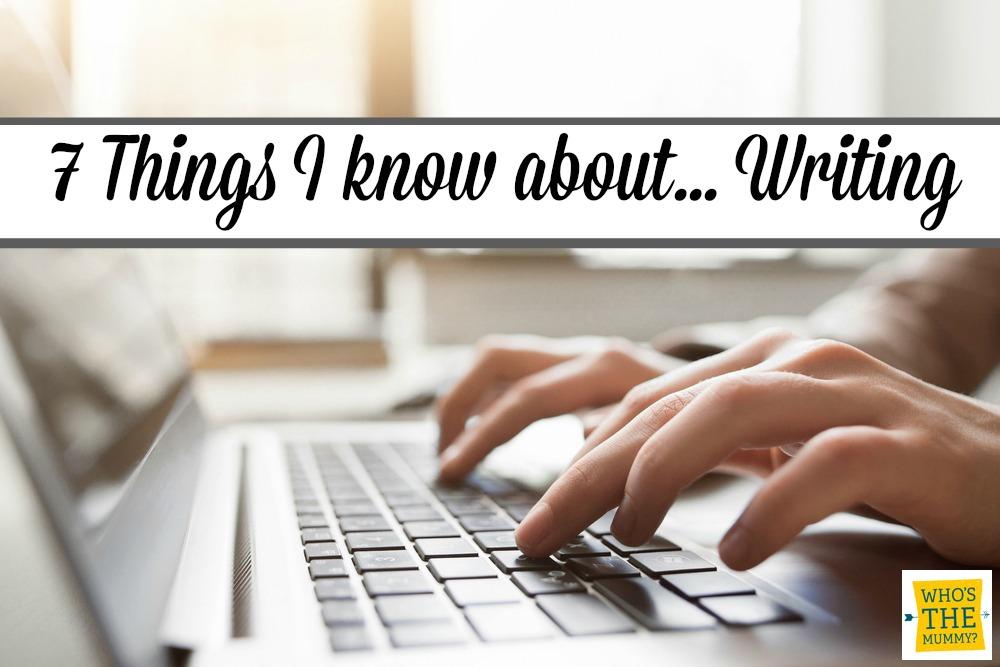
Recently, I attended a blogging event and conversation turned to writing.
I was chatting with a woman who had possibly enjoyed a glass or two of champagne. “Thing about you Sally, is you’re a writer, you’re a journalist,” she said. “You know how to WRITE.”
Before you think this is a post about “HOW AND WHY I BECAME SUCH A FANTASTIC WRITER“, the woman in question went on to ask me when I was last REALLY proud of something I wrote on this blog. She said it was probably the piece I wrote for Flea’s eighth birthday.
So… three years ago.
It’s been weeks and this comment is STILL rattling around my head.
The lesson we learn from this, friends, is that writing is all subjective. No matter what you’re writing, some people will love it and be moved by it, others will find it dull. If you don’t want to lose your mind, you have to be your own judge and critic. If something is an honest expression of what’s in your head at that moment, then it’s good enough.
I’ve been a professional writer now for 20 years. I’m fairly confident I can use words to tell a story. So I thought today I might share seven things I’ve learned about writing during that time. But above all, remember that your writing is yours – if it means something to you, that’s the best measure of success. Don’t let other people shake your faith!
1. Just Do It
As a journalist, probably the single best piece of advice an editor ever gave me was, “Don’t get it right, get it written.”
When you’re working to daily deadlines the priority is to get words on the page – better that your copy is less than sparkling than there’s a blank space in the paper, or magazine. It’s also a lot easier, and quicker, to edit something that’s just okay, than to write something perfect first try.
So when you’re staring at a blank screen thinking, “Oh God, I am a talentless moron without an interesting thought in my head,” just start writing. Don’t stop to second guess what you’ve written until you’re well past the halfway mark.
2. Edit Ruthlessly
This tip is linked to tip 1. Once you’ve written something quickly, you need to edit. If you’re a writer of any sort, I recommend you don’t touch fingers to keyboard until you’ve bought the Oxford Guide to Writing. It’s got all the tips you’ll ever need on editing, writing and more. I still use the editing guidelines from this book, 20 years after I first read it.
Basically, I go through what I’ve written with one finger over the delete key and remove every unnecessary adverb or adjective. If I can say something more simply, I do. Generally, I aim to reduce the length of what I’ve written by 10%, which I’ve learned over the years is my typical word/waffle ratio.
3. Use your Voice
The very best writing is natural. The words you choose, the order you put them in – it’s as much a part of your identity as the story you’re telling, and the pictures you use. Everyone has specific words and phrases that become part of their linguistic style.
Trying to adopt someone else’s style will always be hard work (and won’t ring true for your readers). Personally, when I’m writing a post, I often speak the words as I type them. Sometimes I use a comedy accent, but mostly only if I’m working from home that day.
4. Get to the Point
One of my old news editors used to make reporters read out the first sentence of each news story before we sent it over. About half of the time, he’d respond with, “So f*cking what?” I know. Supportive.
The idea was that a story (or a blog post) should tell readers very quickly why they’re reading and why they should care – because after anything more than three rambling sentences, they’ve moved on to the next item on their reading list.
Having a clear intention for a piece of writing also makes sense from an SEO perspective, and means those snippets that appear on social networks when you share links will actually make sense.
5. Suck, sometimes
If you worry endlessly about being a “good” writer, and write stuff that never sees the light of day, writing is going to feel like a chore. Try giving yourself permission to try something new, write outside your comfort zone, broach new topics. So it might suck? What’s the worst thing that’s going to happen? Sometimes bad writing is the price you pay for learning what really works well, and discovering something you didn’t know you could do.
6. Look Around
I think we’re all guilty of life feeling a bit routine sometimes. Get up, breakfast, school run, work, home, dinner, TV…
At times like those, I can struggle for inspiration. “Why bother writing? Your life is SO BORING,” my inner critic tells me. The key to overcoming writers’ block is to get inspired. Read other blogs, from new niches and countries. Follow a dozen random links from a newspaper column you like, and see where you end up. Heck, you can even find writing challenges on Pinterest if you fancy challenging yourself. Just keep writing, as regularly as you can. The more you do it, the easier it is to feel inspired.
7. Spell Check
In my younger days, I’m embarrassed to say I was one of those people who judged others by their grammar and spelling. These days, I’m a bit older, and I tend to think it’s a fairly awful thing to do – shaming someone who is trying to use their voice, to tell their story, just because they’re not following the strict rules of language. That said, if you’re writing for an audience, your readers will thank you for making use of a spell check. Spelling mistakes and poor grammar make it harder, and slower, to follow your writing. Making life easier for the reader is something we can all work on, I think.
Tell me about your top tips for writers in the comments, I’d love to hear them!





“Basically, I go through what I’ve written with one finger over the delete key and remove every unnecessary adverb or adjective. If I can say something more simply, I do. Generally, I aim to reduce the length of what I’ve written by 10%, which I’ve learned over the years is my typical word/waffle ratio.”
“I go through what I’ve written and remove every unnecessary word. I aim to reduce the length by 10%, my typical word/waffle ratio.”
🙂
I see what you did there. Heck, it’s not news, it’s a feature. I’m allowed a *little* leeway, Tim….
My top tip for writers is to read more. Read anything – magazines, blog posts, novels, good books, bad books, anything. Join a book group so you have to read stuff somebody else chooses. Reading is like fuel for writers and the more you read, the more you will learn and the better a writer you will become.
Ultimately blogging is story telling (yes, even product reviews) and so we as bloggers can learn a lot from all the other stories around us.
Definitely 🙂
I had to laugh at the comment about being most proud of a post three years ago. Classic oneupmanship.
Possibly, but I like to think it was just a tipsy person phrasing it badly. I’m sure shade wasn’t intended!
I’m definitely breaking away from cutting and pasteing a section of the post and rewriting it in one sentence as a) it wouldn’t be your voice and b) see the point so brilliantly made in section 1. Reading this made me feel OK about my writing, so from that point of view it’s a great post!
Huzzah!
I read the Oxford Guide to Writing just over 20 years ago! I so want to be a good writer but I too often become mechanical in what I write and end up going over it adding some waffle to pad it out. I always use a spell checker and will often use Grammerly too, although I hate it because it wants to cut out all the waffle I’ve taken so much time putting in.
Trying to imitate someone else will never work, but reading others will help you find your own voice.
I will always believe that I wrote better before, when I knew that no-one was reading me.
Please can you call me next time you do the ‘read aloud comedy accent’ thing? A brilliant read. Although I don’t remember the 8yo birthday post so perhaps that one is better…
You make a good point about judging people on their spelling and grammar. I definitely judge too much and I shouldn’t. I’m really interested in the oxford guide to writing too. I work as a copywriter and get on fine with that but when it comes to my blog I’m never entirely happy with it. I’ll take a look at the writing guide to see if it offers any clarity!
Nat.x
I totally judge. Total Nazi over it. It might have to be the most irritating thing about me, because I’m never going to lose it. Oh God, imagine how I will be in old age, when everything bad about you just gets accentuated!
PS. I totally just deleted the last 16 words and retyped them so I could add a comma after God… 😉
I’m going to be a hideous pensioner. I made peace with it a long time ago.
The guide is honestly really useful, along with Stephen King, it’s one of the best books on writing, I think.
I’ve definitely had to learn to just ‘get it written’. I used to spend ages thinking about my first line etc. etc. But then I heard someone (I can’t remember who) saying that your first draft is simply ‘keyboard vomit’! Since then, if I’m finding it hard to get started, I just myself to produce some keyboard vomit.
Lovely image but it works!